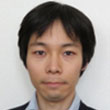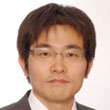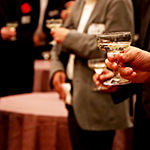- ホーム
- Lauréats et Cérémonie du Prix Scientifique Kiyoko Goto et Paul Bourdarie
- Cérémonie
- 9EME EDITION DE REMISE DU PRIX (2020)—ANNULEE
Cérémonie
9EME EDITION DE REMISE DU PRIX (2020)—ANNULEE
C'est avec grand regret de vous informer que la 9ème cérémonie de remise du prix scientifique Kiyoko Goto et Paul Bourdarie, qui devait se dérouler le 8 juin 2021 à la Résidence officielle de l’Ambassadeur de France au Japon est annulée en raison de la propagation du coronavirus(COVID-19). Nous vous remercions pour votre compréhension.
| Title | Kiyoko and Paul Bourdarie-Goto Scientific Prize |
|---|---|
| Laureate |
 Kenichi YOSHIDA, M.D., Ph.D. |
| Wellcome Sanger Institute / Postdoctoral fellow | |
| Paper | Tobacco smoking and somatic mutations in human bronchial epithelium (Nature. 2020;578;266-272.) |
| Reason for selection (Dr. Jun NAKAJIMA, Chairman of the Advisory Committee) |
Dr. Yoshida and colleagues performed whole genome sequencing of colonies from human single bronchial epithelial cells, and they found that the mutational signature in normal bronchial epithelial cell is increased with respect to tobacco smoking. The findings are informative for understanding etiology of smoking-related lung cancer and future application in risk prediction and early diagnosis. Furthermore, they suggested that the accumulation of this genomic abnormality might be restored after smoking is stopped. These findings are unique, and they will contribute to further cessation of smoking. |
| Message from the Laureate |
First of all, I would like to express heartfelt condolences for Mr. Paul Bourdarie. I am grateful to the Foundation and the co-authors, who were involved in this study, for receiving this award.
The profound effects of tobacco on the genome of lung cancer cells are well-documented, but equivalent data for normal bronchial cells are lacking. In this study, we aimed to study genetic alterations in normal bronchial epithelial cells in detail. As a result, we showed that tobacco smoking significantly increased somatic mutations in normal bronchial epithelial cells. Driver mutations, which are thought to be direct causes of lung cancer development, also increased with smoking. A population of cells in individuals with a history of smoking had mutational burdens that were equivalent to those expected for people who had never smoked. These “near-normal” cells were more frequent in ex-smokers than current smokers, which could be associated with the reduction of lung cancer incidence after stopping smoking. Thus, this study highlighted the harmful effect of tobacco smoking and the importance of quitting smoking, which is expected to be messages contributing to the elimination of lung cancer in the future. Based on the result of this study, I hope to continue the research for the early detection or prediction of lung cancer in the future. |
| Title | Kiyoko and Paul Bourdarie-Goto Scientific Prize -Special Award |
|---|---|
| Laureate |
 Kenji CHAMOTO, Ph.D. |
| Department of Immunology and Genomic Medicine Kyoto University Graduate School of Medicine / Associate professor | |
| Paper | Combination of host immune metabolic biomarkers for the PD-1 blockade cancer immunotherapy. (JCI Insight. 2020 Jan 30; 5(2): e133501.Published online 2020 Jan 30.) |
| Reason for selection (Dr. Jun NAKAJIMA, Chairman of the Advisory Committee) |
Dr. Chamoto and colleagues demonstrated the novel metabolic biomarker in the Programmed Cell Death Ligand 1 (PD-L1) inhibitor immunotherapy, clarifying the relationship of cellular tumor immunity and T cell energy metabolism. This is a unique basic research that will contribute to the development of cancer immunotherapy in the future. |
| Message from the Laureate | I would like to express my heartfelt gratitude for receiving the 9th Kiyoko and Paul Bourdarie-Goto Scientific Prize (Special Award). For about 20 years, I have been involved in cancer immunology research, which uses immune power to treat cancer. Until about 10 years ago, cancer immunotherapy was regarded as something to be frowned upon and its importance was not paid attention to. However, with the discovery of PD-1blockade antibody therapy, cancer immunotherapy has now become a front-line treatment in the field of lung cancer. It is necessary to identify biomarkers that can distinguish between patients who respond and those who do not. Since many factors on both the cancer and immune sides are involved in the cancer immune response, it was necessary to combine multiple biomarkers rather than a single marker. I’m very honored to have been recognized for this research paper. In the future, we would like to clarify the biological significance of these markers and further develop them for the use in actual clinical practice. |
Cérémonie
-

12ème édition du prix scientifique Kiyoko Goto et Paul Bourdarie(2023)
12ème édition du prix scientifique Kiyoko Goto et Paul Bourdarie(2023)
-

11ème édition du prix scientifique Kiyoko Goto et Paul Bourdarie(2022)
11ème édition du prix scientifique Kiyoko Goto et Paul Bourdarie(2022)
-

Annulation de la Cérémonie
Annulation de la Cérémonie
-

9EME EDITION DE REMISE DU PRIX (2020)—ANNULEE
9EME EDITION DE REMISE DU PRIX (2020)---ANNULEE
-

8EME EDITION DE REMISE DU PRIX (2019)—ANNULEE
8EME EDITION DE REMISE DU PRIX (2019)---ANNULEE
-

7EME EDITION DE REMISE DE PRIX(2017)
7EME EDITION DE REMISE DE PRIX(2017)
-

6EME EDITION DE REMISE DE PRIX(2017)
6EME EDITION DE REMISE DE PRIX(2017)
-

5EME EDITION DE REMISE DE PRIX (2016)
5EME EDITION DE REMISE DE PRIX (2016)



